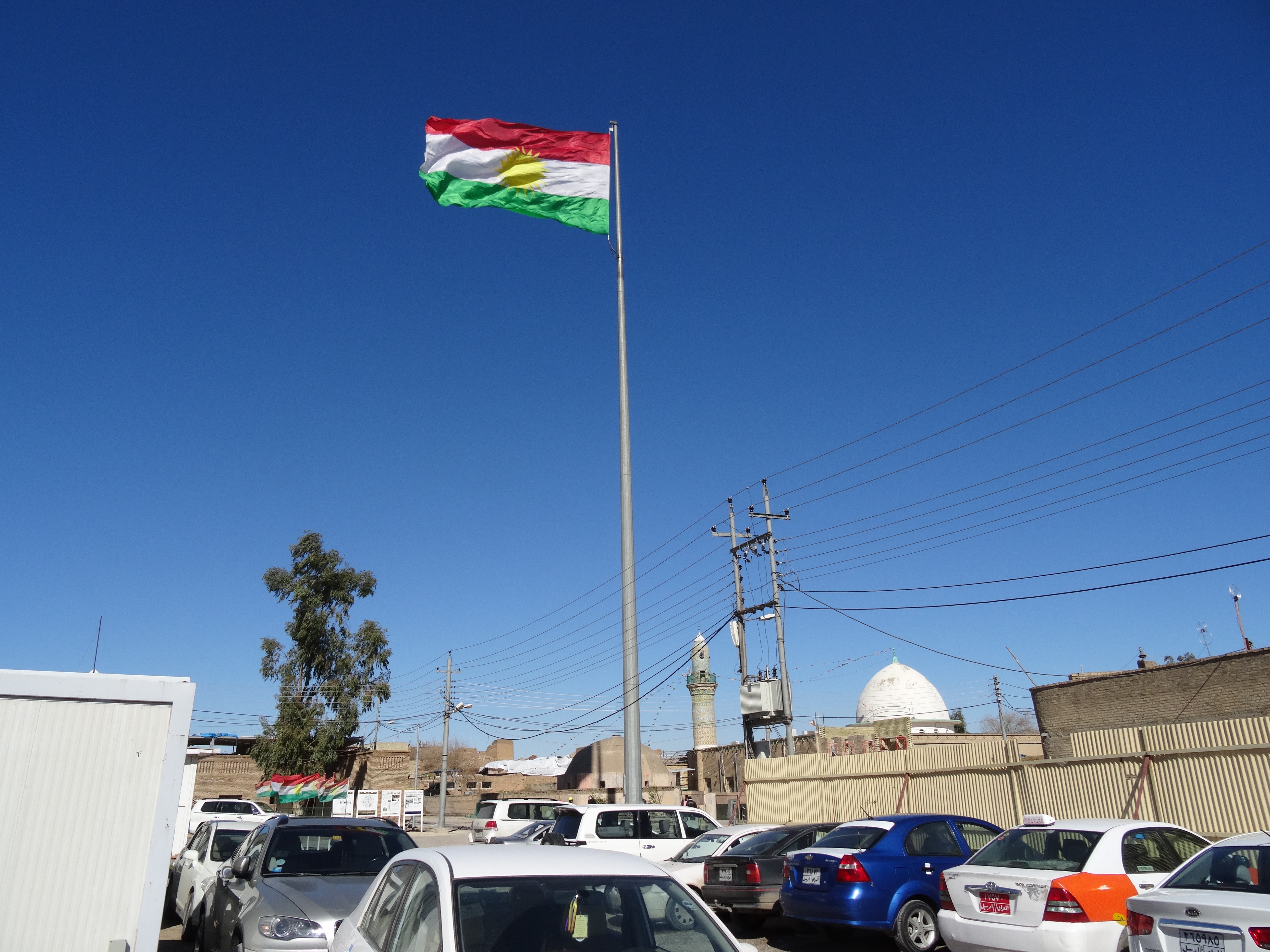
As part of our “Would Someone Please Explain This to Me” series, Carter asked:
“This is what Barham Salih, the former prime minister of the Kurdistan Regional Government, told me years ago: ‘Compare us to other liberation movements around the world. We are very mature. We don’t engage in terror. We don’t condone extremist nationalist notions that can only burden our people. Please compare what we have achieved in the Kurdistan national-authority areas to the Palestinian national authority. … We have spent the last 10 years building a secular, democratic society, a civil society.’ What, he asked, have the Palestinians built?” Is this a fair comparison?
Great question. Your quote expresses a familiar refrain for non-violent separatist movements seeking autonomy or independence, especially with reference to Israel-Palestine. To wit, according to an unnamed young Tibetan in Dharamsala,”Look at Palestine and Israel. Such small places compared to Tibet, but the world pays them so much attention because of the Intifada, the suicide bombers and Osama bin Laden. What has nonviolence achieved for the Tibetan cause, apart from some converts to Buddhism in the West?” One could likely find similar arguments by Somalilanders, Saharawis, and perhaps even Catalans.
The Uneven Playing Field
My work on secession shows that, widely-held ideals like popular authority and good governance recommend a non-violent means of achieving statehood that does not reliably achieve it. In contrast, some independence movements that utilize coercive tactics against their governments and civilians, often with dubious claims to effective and legitimate authority, are welcomed into the international community regardless. The most important explanation behind this pattern is that the baseline prospects of success are strikingly different. The second is that international politics influence determinations of new statehood.
In the handful of countries with legal provisions allowing for the possibility for secession, among them Canada, Britain, Belgium, Denmark, and even Ukraine, normal politics and non-violent tactics probably provide an optimal strategy for seeking independence. So long as a group can rally the vote in sufficient numbers, an amicable divorce is possible. In the vast majority of cases, however, domestic laws do not approach the topic of secession (e.g. the US) or explicitly outlaw it (e.g. China). In those circumstances, violence is typically used by at least one party. And in the historical cases where a government used violence unilaterally against a secessionist movement, none of the secessionists were successful. In other words, the idea of non-violent self-determination (through secession) seems to work best in the countries that are the least likely to violently repress their citizens and are therefore also the cases in which independence is least warranted, normatively speaking, as a remedy for governmental abuse or disenfranchisement.
Meanwhile, international law is silent on the issue; secession is neither legal nor illegal. To be sure, if a government commits extensive war crimes, slaughters civilians, or engages in a genocidal campaign, there are remedial laws to punish it. However, outside governments are loath to become involved in other countries’ internal affairs, and even more so when only a principle – and nothing of tangible importance to them – is on the line. States can and do intervene politically and militarily in secessionist conflicts, as we have witnessed in Iraq, but for parochial reasons in addition to (or in spite of) the defense of self-determination and legitimate rule. In Kosovo, frustration with the international community’s perceived hypocrisy and indifference led a once non-violent movement to pursue violence instead.[1]
If it ain’t broke…
So in the few cases where groups without the legal means to pursue independence nevertheless achieve substantial de facto sovereignty, why doesn’t the international community recognize their legitimacy and establish diplomatic relations with the new country? Why don’t state leaders reward non-violent achievement consistent with their normative beliefs? Why doesn’t the favorable comparison between Kurdistan and other, perhaps less successful, independence movements yield tangible gains in its external legitimacy?
Violence and crisis command attention and spur action. In these cases, being a harbor in a tempest doesn’t get you closer to what you want. Perhaps counterintuitively, stability and effective authority makes the issue of independence less pressing for the international community. State leaders may also believe that a pronouncement supporting independence will catalyze opposition and generate violence in the region. This belief has certainly informed the non-recognition of Somaliland in Somalia. Further, it is how outsiders have convinced the Kurdistan regional authorities to put off demands for formal independence and remain within Iraq up to this point. Additionally, given the U.S. track record during the National Uprising in 1991, KRG authorities are justifiably wary of their chances in a violent campaign for independence should the U.S. continue to insist upon a united Iraq.
Proto-Diplomacy
To be sure, outsiders aren’t the only factor determining secessionists’ fates. But they are uniquely able to grant recognition, which, in sufficient quantity, determines the new members of the international community. Without that recognition, Kurdistan’s oil contracts may not hold and foreign direct investment will remain too risky for most others; its legal right to self-defense is dubious; it has no voice in international forums like the UN and cannot receive formal development assistance from institutions like the World Bank and IMF; and various routine activities like traveling across borders are significantly more difficult.
Though some downplay external legitimacy’s importance, secessionist movements are keenly aware of how valuable it can be and work hard to get the benefits that flow from it. They create “embassies” in world capitals; they hire lobbyists and PR firms to get the word out; they make corporate contacts with potential investors to get them to lobby governments on their behalf. They generally start behaving as though they are already good, responsible members of the international community. Once we appreciate the stakes involved in proto-state diplomacy, we can also see how the particular quote above is part of a larger rhetorical strategy by the KRG. We can see a similar strategy at work in Somaliland’s strong partnership with the U.S. and others in their counterterrorism and counterpiracy efforts. Both attempt to cast independence as ‘in America’s self-interest’ and ‘consistent with its core values’ in contrast to other, less deserving proto-states or regimes.
The complexities that Iraqi Kurdistan faces are emblematic of those confronted by unrecognized proto-states. And I agree that the situation feels unjust. Unfortunately, there isn’t a surefire alternative that’s better than the ad hoc approach to independence that we’ve got. In retrospect, greater adherence to widely held beliefs like non-violence and popular authority would sometimes have yielded stronger or more normatively desirable states, but in others, weaker or more undesirable states. While South Sudan voted overwhelmingly in favor of independence and was warmly welcomed into the international community, it has struggled with internal unity and effective governance. Furthermore, a more consistent, less hypocritical recognition pattern would likely alter the dynamics of secessionist conflicts themselves, and perhaps in unintended ways. It might, for example, lead governments to crack down on nascent independence movements so thoroughly that they cannot achieve the degree of success we see in Kurdistan or Somaliland or Tibet. Or it might result in a wave of new domestic laws forbidding secession. Most importantly, it might destabilize relations among strong states that have, despite their disparate interests, fairly consistently reached a consensus regarding which actors are and which actors aren’t endowed with the rights and responsibilities of sovereignty.
**If I misunderstood and you were asking whether the analogy between Palestine and Iraqi Kurdistan is appropriate, it really depends on the dimension of comparison. Probably the most obvious difference between them has been the Iraqi Kurds’ decision to remain within Iraq and not formally pursue independence since 2003. To my mind, the Israel-Palestine case is sui generis and does not fit comfortably under the heading “secession.”
[1] The likely catch-22 for these groups that decide to utilize violent tactics is their branding as ‘terrorists,’ which serves to undermine their credibility and decrease sympathy among world leaders.





1 comment
There’s also the general agreement of “no new nations and no changed borders” from the aftermath of two world wars. Hard to say how strong that is after Crimea, but at least at this time most of the other major nations don’t have many disputed territories.